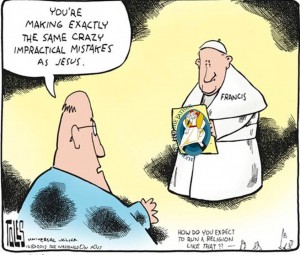 Year of Mercy – Reflection for 4th Sunday in Ordinary Time (31 Jan 2016)
Year of Mercy – Reflection for 4th Sunday in Ordinary Time (31 Jan 2016)
(Disclaimer: The following lines are product of pure imagination!)
Mr Pius is a good Christian.
He goes to church even on week days.
He reads the Bible very regularly.
He says all his long prayers very diligently –
even if often he would say them rather hurriedly.
He is an educated man, and he reads even the documents of the Church.
He is aware of the current debates that are going on in the Church.
He is in-charge of the formation of laity in his parish.
He has his positions clear:
The interpretation of the traditional teaching of the Church should not be watered down –
Not even in the name of mercy!
He believes that God is a just judge.
He will punish the wicked in time.
They will be condemned to hell,
So are the non-believers.
Heaven is surely for the just Christians – may be, only for the Good Catholics!
Whenever there would be some room for lack of clarity in the sermon of the parish priest,
Mr Pius would be the first to warn the priest that
his teaching could be misleading to the “simple Catholics”
– such as those in his formation classes.
So preachers and writers should be very careful – according to Mr Pius.
Otherwise the preachers are also going to hell, for misleading the people.
You remember the millstone on the neck! (Mt 18:6).
One Friday evening when Mr Pius was reading the Bible,
He came across these lines from Prophet Isaiah (61:1-2, RSV):
“The Spirit of the Lord GOD is upon me,
because the LORD has anointed me to bring good tidings to the afflicted;
he has sent me to bind up the broken-hearted,
to proclaim liberty to the captives,
and the opening of the prison to those who are bound;
to proclaim the year of the LORD’s favour,
and the day of vengeance of our God;
How true, Mr Pius thought, God is just.
He will come with vengeance for the wicked.
The year of favour
(including good news, liberty, release) is only for the good Christians!
As for the evil people, the year of favour will be the day of vengeance!
In fact, reading the whole chapter of Isaiah 61, Mr Pius’ position was further confirmed:
“For I the LORD love justice, I hate robbery and wrong” (verse 8).
The next day was the Sabbath.
He found himself in the synagogue in Nazareth.
The service was well-prepared.
After the usual first reading from the Torah, which was read by the Rabbi himself,
there was a psalm that was sung.
Then it was the turn for a lay person to do the second reading.
The Rabbi of the synagogue invited a young man – a mere thirty-year-old,
Who was just a village carpenter,
But who had begun to preach in the recent months in the Capernaum area;
People claimed that he had worked already several miracles in the northern districts.
However, this was the first time that he was coming to his home-village.
His name was Joshua!
The Rabbi handed over to him a scroll for the second reading.
Joshua unrolled the scroll and began to read,
in a very meditative-personalised tone.
It was as if he knew it “by-heart”:
“The spirit of the Lord is on me, for he has anointed me
to bring the good news to the afflicted.
He has sent me to proclaim liberty to captives,
sight to the blind,
to let the oppressed go free,
to proclaim a year of favour from the Lord.”
Mr Pius could almost read together with Joshua those lines from Prophet Isaiah.
How strange he had read the original just the previous night!
He listened to the reading with a sense of awe.
How well does this guy read the text!
He seems to know it too. He makes it his own.
Then came a surprise:
Joshua had finished reading.
To indicate very clearly that he was not reading from Isaiah anymore he closed the scroll,
He sat down, as if he was a man of authority,
and began to speak in his own words.
What?
Where is the line on “the vengeance from our God”?
Mr Pius began to wonder.
Similar sentiments were expressed by others too in the crowd.
What, is Joshua greater than our prophets?
Who is he to change the nature of our God?
We know our God is a Just God – that is what the Bible says!
Mr Pius wanted to do something about this, so desperately.
What more?
Joshua goes on to say: you shouldn’t think you know God fully,
Don’t you ever think you have a hot-line to him!
Don’t take for granted that God is so familiar to you,
just because you read the Bible, or because you say your prayers!
(“Is not this Joseph’s Son”, verse 22).
And please, you cannot condition God asking for a miracle whenever you want –
even in the name of ardent faith;
That would be putting the Lord God to the test!
(“We have heard you did at Capernaum, do here also in your own country”, verse 23).
Joshua still goes on – how arrogant is he:
Moreover God is not concerned with whether you are good or bad,
a believer or not, if you are in the synagogue or not;
God seeks out people at the margins, the periphery:
Such as, the widow of Zarephath,
And Naaman, the Syrian!
This was simply too much:
“And they all rose up and put [Joshua] out of the city,
and led him to the brow of the hill on which their city was built,
that they might throw him down headlong.
But passing through the midst of them he went away” (Lk 4:29-30).